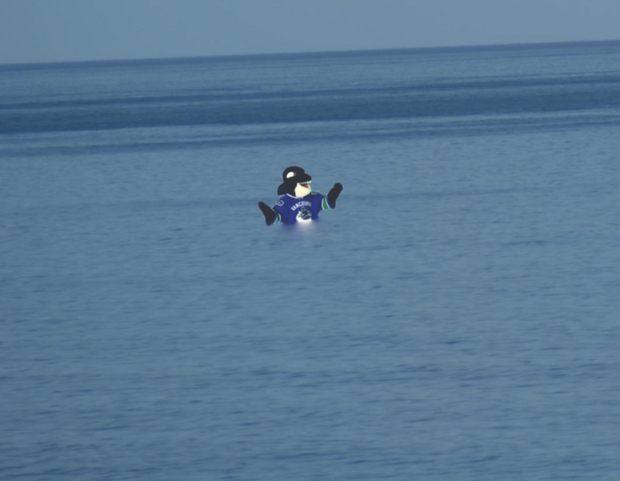


VANCOUVER – Buckling under mounting pressure from animal rights activists, the Vancouver Canucks released their mascot, Fin the Whale, back into the wild earlier this week.
Fin, a lovable killer whale measuring 6’3″ best known for playfully “chomping” on hockey fans’ heads at Canucks home games, had exhibited increasingly erratic and dangerous behaviour in the past year. Team owners decided to return the whale when it became clear it was putting the fans at risk, and many are blaming the stress of captivity along with the demands of life as a mascot for Fin’s outbursts.
“He just went totally apeshit on many occasions,” said Glen Farley, a season-ticket holder. “Usually he’d just chomp one or two heads every now and then and pose for a picture. But I’ve seen a couple of games where he was chomping heads left and right, and really sinking his cotton teeth into people’s necks. Beer was spilling everywhere, little kids were falling down. It was a nightmare.”
Raynne Bower, a representative for the People for the Ethical Treatment of Animal Mascots (PETAM), says this kind of unpredictable behaviour is unfortunately common for wild animals forced into mascot captivity.
“Ask any marine animal psychologist. If you dress a killer whale like Fin in a hockey uniform and a tuxedo with a top hat, he’s eventually going to lose it. He can’t thrive in such humiliating circumstances.”
Bower and his team spent the weekend helping Fin reintegrate into his natural ocean habitat. Most efforts to reintegrate mascots into their natural habitats are complicated and uncertain procedures, according to Bower.
“We took him into the middle of the ocean,” Bower explained. “Right up until we dropped him in, he was making incredible, almost muffled screams of excitement, ones I’d never heard before. He was probably so used to living on dry land that the ocean was foreign environment to him. We had to use physical force and spend several hours making sure he would go underwater because he kept trying to come up to surface.”
This is not the first time PETAM has successfully released captive mascots back into the wild.
“Releasing Ace [the Toronto Blue Jays mascot] was so rewarding,” Bower said. “Placing him at the very top of that spruce-fir, holding on so tightly, not looking down, like he wanted to stay there forever and never touch land again. It was one of the best moments of my life.”
Yet Bower says there is still much work to be done to put an end to the use of mascots.
“It’s astounding how many teams hold animals in mascot captivity, treating them and their entire species without an ounce of respect or dignity,” Bower said. “Why can’t more teams be as civil and humane as the Cleveland Indians?”
Unfortunately, the celebration surrounding Fin’s release from captivity was short-lived. A few days after Fin was freed, a passerby on a northern California beach notified authorities that he had seen a beached killer whale.
“We think he died prior to being washed ashore,” said Lucas Diego, the region’s beach patrol officer. “It appears to have to do with his diet. We found a full-grown man inside of him, practically undigested.”
with files by Sara Farb

